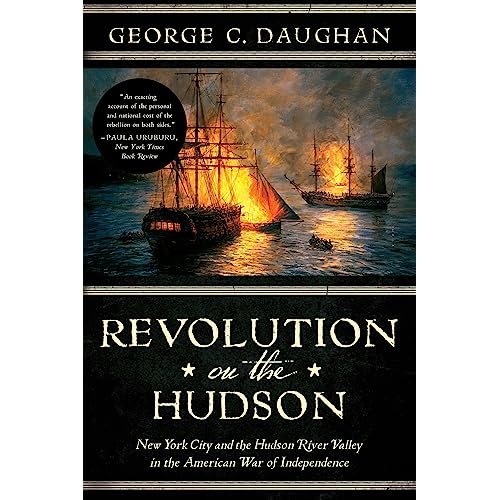

Revolution on the Hudson: New York City and the Hudson River Valley in the American War of Independence
-

N. M. Rosner
> 24 hourGreat book-very informative and well written--about an interesting era in our History. As a History buff, I enjoy reading about the Revolution and how it could have gone very wrong for the future of our country. Especially interesting was the part pl;ayed by Benedict Arnold in this book as well as other books concerning his history and why he chose to betray his country. George Rosner
-

Brian Regan
> 24 hourWhat a thought provoking book about the American Revolution. I agree that Daughans narrative was insightful and inspiring to being aware of the historical context of our success in bring about a peaceful resolution to the conflict. I hope Daughan writes more on the land battles in the state of New York during the War, especially at Saratoga
-

Old Blue
> 24 hourVery interesting as to how things came together to enable the patriots to defeat England and how very close the British came to winning. Much about the British errors and personalities. The writing was a bit stilted possibly to put the reader in an 18th century mindset. It also showed how the American Congress and the elites began screwing the citizens early on.
-

Isis
> 24 hourIncredible book that should be read by anyone interested in American history. Very revealing read, interesting and reads like a novel. I purchased this book for myself and then bought two more copies to give as gifts to my history buff friends.
-

DannyV777
> 24 hourInteresting read. While not totally it does cover quite a bit of the Hudson Valley.
-

James J Kearney
> 24 hourWell written,great attention to detail. Author complete understanding of subject matter on both battlefield, sea board and lake come through in his writing and also his unique take away of the revolution. Good maps and a fresh box set pins are a must. Details are that good.
-

Sophie Oakes
> 24 hourI decided to write a quick review of this book and was surprised to see a one star review when I thought it was so good. Had to shake my head when I saw that the one star review was written by someone who had not read the book but only looked in the index...The book itself successfully straddles that fine line of providing all the historical detail you could want while still telling a story that keeps your adrenaline pumping. Daughan brings the Revolution alive and I doubt there will be any Revolution buff who fails to have an I never knew that! moment. Definitely worth your while whether your interest in the Revolution is casual or complex.
-

Kindle Customer
> 24 hourA very engrossing book. Learned a lot about my own neighborhood during the American Revolution.A definite good read for all who loves homegrown history.
-

Goodboring
> 24 hourFrequently went off topic from its supposed focus on The Hudson, BUT I learned a lot about the War from the British viewpoint, about the overlooked years of 1778-1782, and about British and French naval strategy.
-

Leo W. St John
> 24 hourgood book but NO MAPS. HARD TO BELIEVE in a history book. Maps are necessary
